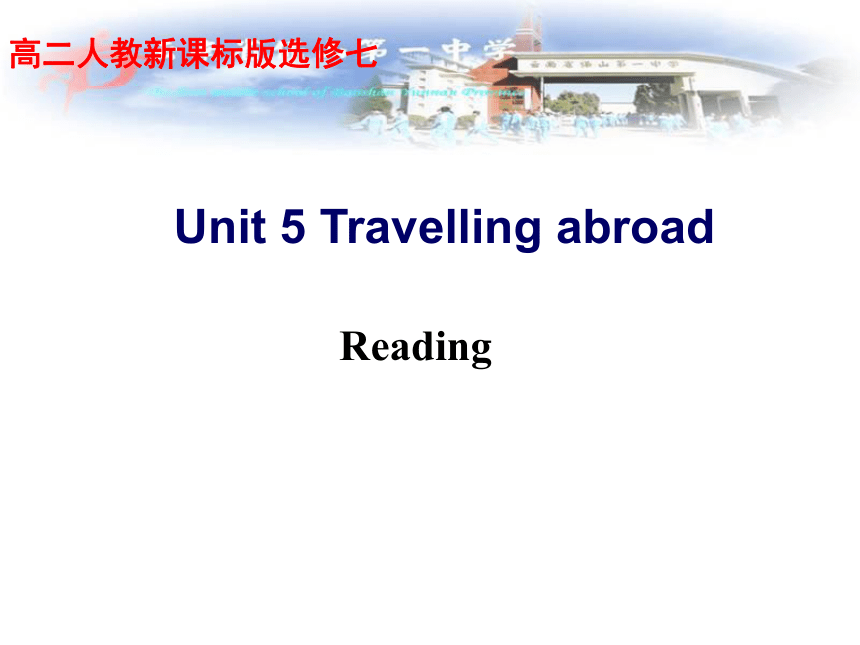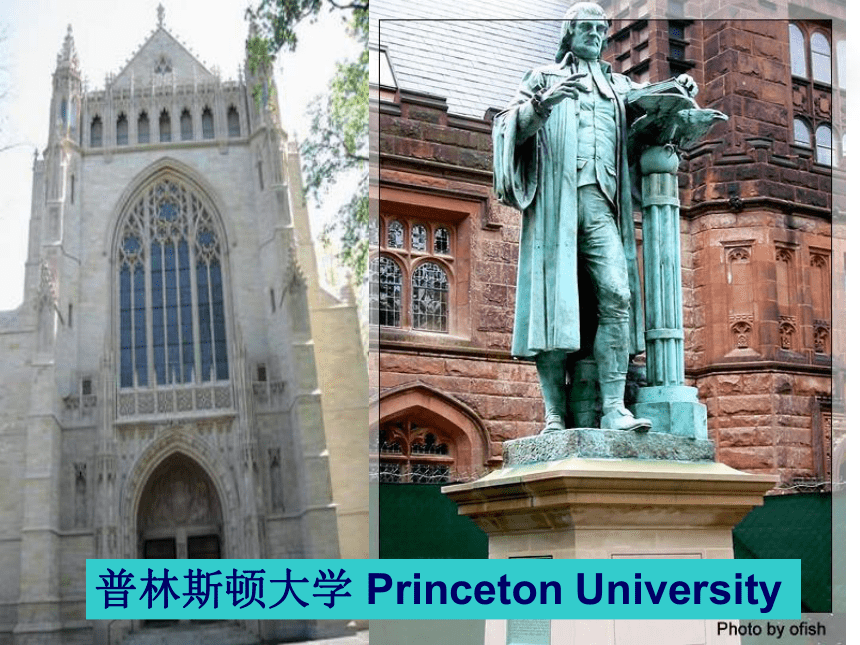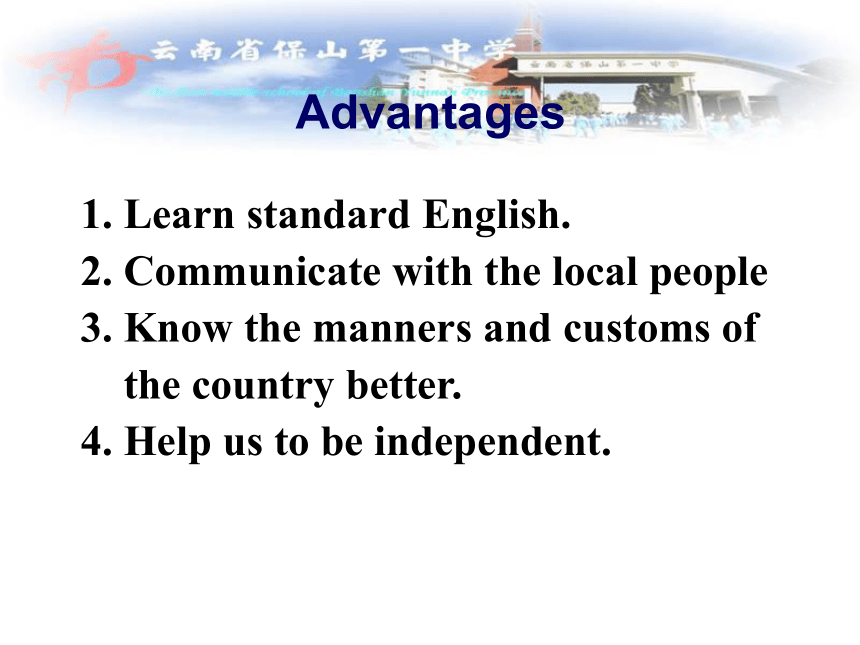【备课参考】(人教版)高中英语选修7课件:Unit 5 Travelling abroad Reading(共68张PPT)
文档属性
| 名称 | 【备课参考】(人教版)高中英语选修7课件:Unit 5 Travelling abroad Reading(共68张PPT) |

|
|
| 格式 | zip | ||
| 文件大小 | 3.7MB | ||
| 资源类型 | 教案 | ||
| 版本资源 | 人教版(新课程标准) | ||
| 科目 | 英语 | ||
| 更新时间 | 2015-08-01 00:00:00 | ||
图片预览












文档简介
课件68张PPT。高二人教新课标版选修七Unit 5 Travelling abroad Reading Pre-reading
If you are offered a chance to study
abroad for a year, where would you
like to go?HarvardOxford Cambridge麻省理工学院
Massachusetts Institute of Technology 世界理工大学之最耶鲁大学 Yale University 斯坦福大学 Stanford University 普林斯顿大学 Princeton University The world is getting smaller and smaller.
We have more and more opportunities to
travel or study abroad.
Travelling helps us learn a lot about local
customs and broaden our views. Besides, it is
relaxing and we can get rid of our anxiety
and stress. What are the advantages and
disadvantages of studying in a
foreign country?Discussion:1. Learn standard English.
2. Communicate with the local people
3. Know the manners and customs of
the country better.
4. Help us to be independent.AdvantagesDisadvantages Be difficult for us to communicate
with the foreign people and we should
adapt to the situation quickly.
2. Cost a lot of money.
3. Miss our homes, miss our parents
and friends.Reading Keep it up, Xie Lei
Chinese student fitting in wellkeep it up 保持, 继续干下去
keep spirits/strength/morale etc up: to stay
happy, strong, confident etc, by making an
effort. e.g.
We sang as we marched, to keep our spirits up.
If he could keep it up, he would break the
world record.I don’t think I can keep this up any longer.
to continue doing something
Jack’s having trouble keeping up with the rest
of the class.
to manage to do as much/as well as other people
Employees need to keep up with the latest
technical developments.
to continue to read and learn about a particular
subject 2. (title) Chinese student (is) fitting in well
在英语标题中, 为了简洁需要, 通常只出现实词,
而把虚词、冠词、介词、助动词、连词等略去,
省略是英语新闻标题的一大特点。
fit in (well) = get on/ along (well) 相适应, 相融和
She doesn’t fit in with the rest of the class.
It’s necessary for us to fit in with the times.
be fit for 胜任, 适合, 合格
be fit to do sth. 适合做……
fit in with 适应, 适合 keep fit 保持健康
fit v. 适合, 安装 adj. 适合的, 能胜任的New wordsboard vt. 上(船、飞机)
qualification n. 取得资格
recommend vt. 推荐; 介绍
comfort n. 舒服; 舒适; 安慰
substitute n. 代替品
requirement n. 需要; 需求acknowledge vt. 承认; 确认
occupy v. 占领, 使忙于
enterprise n. 事业计划; 事业心
succeed v. 成功; 继任
Comment n&v. 评论; 批评Fast ReadingFind out the main idea of each
paragraph. Para 1: Xie Lei, a Chinese girl, is studying
in a foreign country-London.
Para 2: The general introduction to Xie Lei
and her study.
Para 3: The difficulties that Xie Lei met while
living in London. Para 4: The advantage that Xie Lei gained
while living with a host family.
Para 5: Xie Lei is getting used to the western
university’s way of learning.
Para 6: Xie Lei is now getting along well and
is living an active life.
Para 7: The newspaper will follow Xie Lei’s
progress in later editions. 1. Which country does Xie Lei study in?
How long has she been there?She studies in England.
She’s been there for six months. Answer the questions.2. What is the main idea of the passage? It talks about the Chinese student Xie Lei’s experience in the UK.3. Why do you think the reporter used some
direct speech in the article? The writer used direct speech to show that
he got the information in the article from
Xie Lei herself. It also makes the article
more interesting and gives some insight into
Xie Lei’s character.4. Where do you think this article might
have been published? It may have been published in a student
newspaper/magazine or in a small local
newspaper.Choose the best answer.1. Who does Xie Lei live with in
England?
A. Her classmates
B. Herself
C. A host family
D. Her familyC 2. Why does Xie Lei like to live with a
host family?
A. She feels lonely.
B. She is afraid of the new life.
C. She can make good preparations
for her courses.
D. She can learn more about life and
customs about the country.D 3. What does Xie Lei try do to get used to
the new life in England?
A. Avoid rising a feeling of homesick.
B. Join clubs and make new friends.
C. Put her heart into her preparation
course.
D. Learn hard about the strange
environment.B 4. What can we learn about Xie Lei from
the passage?
A. She is timid.
B. She is brave.
C. She is determined.
D. She is honest.C ____ The difficulties Xie Lei met.
____ The newspaper will follow Xie Lei’s progress.
____ General introduction to Xie Lei and her study;
____ The advantages of living with a host family.
____ Xie Lei is now getting along well and is living
an active life.
____ Xie Lei, a Chinese girl, is studying in a foreign
country--London.
____ Xie Lei is getting used to the Western
University’s way of learning.Put the events into order.3724615Careful Reading Xie Lei came to the university to
complete a science qualification.
2. At first, Xie Lei didn’t get used to the
life in London, now she gets used to it.
3. Xie Lei lives in the student accommodation.
4. Xie Lei found the preparation course
was very easy to learn at first.True or FalseF T F F Answer these questions about the text.Comprehending Exercise 1What is Xie Lei in England for? How long
has she been in England? She is in England to study at a university.
She’s been in England for six months.2. Why is she doing a preparation course first? Because studying in England is different
from studying in China and she needs to
learn about these differences and improve
her English.3. Why did Xie Lei feel like a child when she
first arrived in England?Because she has to learn how to do everyday
things like using a telephone, paying on a bus,
finding her way around a strange city;
understanding English as spoken in real life;
learning how to write essays acceptable to her
British lecturer.4. Which two types of people have helped
Xie Lei most since she came to England?The host family and her teachers.5. Why has Xie Lei decided to join a few clubs? Because she thinks it’s important to have a balance between study and a social life, and she wants to make new friends.2 Read the passage again, and
fill in the diagram below.Exercise 2Benefits of doing a preparation course
to learn how to fulfill Western academic
requirements.
to get used to a new way of life and
improve her English. of living with a host family
to learn more about everyday life and customs.
to have people to explain things not understoodof having a tutor
1. to explain about why you cannot use other people’s work without acknowledging it.
2. to encourage you to express your own ideas with reasons.Difficulties at the university
1. learning to read widely and analyze the texts.
2. expressing one’s own opinion with reasons.of a new way of life
finding a balance between study and a social life
making new friends.DiscussionWhat kind of person do you think Xie Lei
is? Find evidence in the article to support
your opinion.I think Xie Lei is an excellent diligent girl,
she can face difficulties bravely and she has firm
determination, she studies well and has already
made progress. Evidence:
1. “ It’s not just study that’s difficult.
You have to get used to a whole new
way of life.”Evidence:
2. “When I miss my family, it’s a great comfort
to have a substitute family to be with.”
3. “I have been so occupied with work that
I haven’t had time for social activities.”4. In groups, make a list of problems that
the article mentions Xie Lei had when
she first went to England. Add two or
three other problems she might have
had. Then summarize what you would
do if you had the same problems in
England.1) She didn’t know how to use the phone, how
to pay on the bus, how to ask a shopkeeper
for things she didn’t know the English for.2) When she got lost and had to ask a passer-by
for directions, she didn’t always understand.The problems mentioned in the article:1) Can’t understand the expressions others say.2) Miss her family.3) Unable to adapt to different teaching methods.(ask host family for help)(live with a host family)(be confident and give your opinion)Possible problems she might have
and solutions: 4) How to have a balance between study and
a social life.(join some university clubs and meet people
you have things in common with)1. Understanding and using everyday English.2. Reaching the academic requirements of a
Western university.3. Making new friends. Xie Lei’s problems:Your solutions:1. Listening to the radio or watching television
to become accustomed to everyday English. 2. Asking your tutor for advice before you
start your academic writing.3. Joining a lot of university societies.1. Six months ago, Xie Lei said goodbye to her
family and friends in China and boarded a
plane for London.
六个月以前, 谢蕾告别中国的家人和朋友,
登上了飞往伦敦的飞机。
board n.&v.
1) 上(船或别的交通工具)
2) n. 木板, 纸板, 董事会, 委员会
3) 供食宿Language points e.g. board a plane 搭乘飞机
I’m _________with a friend.
我向朋友提供食宿。boarding与board相关的短语:
on board 在船(飞机、车)上
go by the board 落水或落空
sweep the board 大获成功
be above board 开诚公布, 公开
aboard adv. & prep. 上船/飞机等
take sth. on board 承认, 接受, 采纳2. It was the first time she had ever left her
motherland.
the first time 的用法: 该句使用了句型
“It is+ the+序数词+time+ that从句”, that
从句中的谓语常用现在完成时。如:
He cast his net for the first time.
他撒了第一网。(for the first time的作用
相当于一个副词)
It’s time for sth. 该做某事了。
It’s time that...中, that从句中的谓语动词
用过去时或用“should+动词原形”
(should不能省略)。e.g. It’s time we started.
=It’s time we should start.
辨析: the first time与for the first time
the first time 作n. 或conj.
for the first time 介词短语用作状语Practice:
I thought her honest ____ I met her.
A. first time B. for the first time
C. the first time D. by the first timeC 3. qualification n. [U]取得资格, 合格;
n. [C]资格, 合格证书; 限制条件
归纳拓展:
without qualification 毫无保留地, 无条件地
qualify (sb.) (使)具有资格
qualify sb. for sth. 使某人有资格做某事
qualified adj. 有资格的, 合格的4. preparation n. 准备
The boy was very lazy. He did little preparation for
the exam.
这男孩很懒, 他对考试几乎没有事先准备。
与prepare相关的短语:
be prepared for sth. / to do sth. 对某事做好准备
prepare for sth. / to do sth. 为某事做准备
make preparations for sth. / to do sth.
为某事做准备
prepare sb. (sth.) for sth. / to do sth.
使某人对某事做准备
in preparation 在准备中
make preparation 做准备5. Xie Lei highly recommends it.
1) 辨析: highly 和 high
high表示空间高度, 通常指物;
highly表示程度, 相当于much。The plane was flying _____.
I think _______ of your opinion.highhighlyAlthough he was disabled when he was only
ten years of age, yet he aimed ________,
for which his classmates spoke _______
of him. A. high; high
B. highly; highly
C. highly; high
D. high; highlyD2) recommended vt.
推荐, 赞许 他向学生推荐一本书。
He recommended a book to his students.
劝告, 建议 (作宾语接doing不接to do
不定式, 如allow/advise/forbid/permit等)
我推荐买这支笔。
I recommend buying that pen.
The doctor ___________ his patient to go out
for a walk.recommendrecommend 表示主观判断、推测、建议、命令、
要求的动词, 通常引起虚拟语气的宾语从句,
从句谓语动词常用should+ v. 原形, 且 should
可以省略, 如: suggest/insist/recommend/propose/
require/request/demand etc.
They demanded that the right to vote be given
to every adult.
We insisted that Mr. Brown chair the meeting. 6. It’s not just study that’s difficult.
It is (was) 被强调部分+ that (who) +
句子其他部分。
此结构强调的成分仅限于主语, 宾语和状语。
It is from the sun that we get light and heat.
It was not until I had read your letter
that I understood the true state of affairs.7. take up 1) 占去时间
I won’t take up much of your time.
我不会占用你太多时间。
2) 占去空间
The big bed takes up a lot of room.
3) 从事于, 专注于
He took up maths while at school.
与 take 相关的短语:
take away 拿走, 离开 take in sth. 接受
take in sb. 欺骗 take off 起飞, 取消
take on 呈现, 承担
take on sb. 雇用 take over 接管
take to 喜欢 take turn 轮流8. When I got lost and had to ask a passer-by
for directions, I didn’t always understand.
当我迷路,不得不向过路人问路时,我并不是
总能明白。
got lost是由“get+过去分词”构成的短语,
类似的还有:
get excited, get married, get hurt, get paid,
get dressed, get drunk.9. comfort n. [U]舒适, 舒服; 安慰; n. (常用作
单数)令人感到安慰的人(或事物);vt. 安慰
comfortable adj. 舒适的, 舒服的
comfortless adj. 不舒适的
comfortably adv. 安逸地
10. substitute n. 代替品, 代用品;
vt. 用……代替……
as a substitute 作为代理人/代用品
a substitute for sth. 代替……的人或物
substitute A for B 用A代替B
substitution n. 代替, 替换
make a substitution (of) 替换/取代11. requirement n. 需要, 要求, 规定
meet the requirements of 满足……的要求
raise requirements 提出要求
college entrance requirements in English
大学入学对英语的要求
require vt. 需要, 要求
require sth. of sb. 使做(某事), 使拥有(某物)
[注意]①require与need, want一样, 在表示“需要”
之意时, 后接动名词的主动形式表被动意义,
相当于不定式的被动语态。
② 后跟从句时应用虚拟语气, 即(should)
+动词原形12. acknowledge vt. 承认;确认;答谢
acknowledge sth./sb.
感谢/承认/认可某物/某人
acknowledge sb./sth to be...
承认某人某物是……
acknowledge that 承认……
acknowledge sb. as... 认为, 接受
acknowledgement n. 承认,致谢,答谢
acknowledge sb.向某人打招呼, 问候13. Besides, as far as he was concerned what
other people thought was not the most
important thing.
另外, 他还说别人的想法不是最重要的事情。
1) besides 用作介词, 作“除……之外, 还有”;
There are five other people besides both of us.
它还可以用作副词, 作“还有, 而且”解,
含有肯定和附加的意思。
I don’t want to go out for a walk. Besides,
I’m very hungry.-- They all agree _____ George. Has the project
been passed?
-- Who _____ George can make the final
decision?
A. except; expect B. except; besides
C. but; but D. besides; butA except是“除……之外 (不包括本身在内)”的意思,
含有否定和排除的意思, 表示除去一部分, 着重在
“不包括”(not including)的含义。如:
We invited every boy student except Bob.
除了鲍勃外, 我们邀请了所有的男生。2) concern v. 涉及, 关系到, 关心
n. (1) 关系或利害关系之事 (2) 关心,担心
别管与自己无关的事。
Don’t interfere in what doesn’t concern you.
习惯用法: show concern for sb. 关心某人
她对你的爱情无动于衷,因为她对你毫不关心。
She is indifferent to your love for she shows
no concern for you.
have no concern with sth. 同某事没有关系
I have no concern with your family dispute.
你的家庭纠纷与我无关。 be concerned with 涉及, 与……有关
He was suspected to be concerned with the
bribery case. 他被怀疑涉嫌这起受贿案。
be concerned about/for/with ……关心……
The mother was so concerned for her hospitalized
son that she kept awake for several nights.
这位母亲关心生病住院的儿子, 几夜没有合眼。
so/as far as sb. is concerned. 就某人而言
As far as I’m concerned, I should like to say I am
not in favor of the plan.
就我而言, 我想说我不赞成这计划。14. occupy v. 占领, 占用, 使忙于; 使从事
be occupied in doing sth.忙于做某事
occupy oneself with/in 忙于……; 专心于……
be deeply occupied in thinking 陷入深思
be fully occupied 忙得不可开交
15. enterprise n. 事业, 计划; 事业心
build an enterprise 创办一个企业
conduct/manage an enterprise 经营一家企业
a man of enterprise 富有进取心的人
a spirit of enterprise 进取精神Homework1. Underline all the important and difficult
phrases and sentences in the text.
2. Suppose you have a chance to go to England
for further education, what suggestions will
you make? Write the suggestions.
If you are offered a chance to study
abroad for a year, where would you
like to go?HarvardOxford Cambridge麻省理工学院
Massachusetts Institute of Technology 世界理工大学之最耶鲁大学 Yale University 斯坦福大学 Stanford University 普林斯顿大学 Princeton University The world is getting smaller and smaller.
We have more and more opportunities to
travel or study abroad.
Travelling helps us learn a lot about local
customs and broaden our views. Besides, it is
relaxing and we can get rid of our anxiety
and stress. What are the advantages and
disadvantages of studying in a
foreign country?Discussion:1. Learn standard English.
2. Communicate with the local people
3. Know the manners and customs of
the country better.
4. Help us to be independent.AdvantagesDisadvantages Be difficult for us to communicate
with the foreign people and we should
adapt to the situation quickly.
2. Cost a lot of money.
3. Miss our homes, miss our parents
and friends.Reading Keep it up, Xie Lei
Chinese student fitting in wellkeep it up 保持, 继续干下去
keep spirits/strength/morale etc up: to stay
happy, strong, confident etc, by making an
effort. e.g.
We sang as we marched, to keep our spirits up.
If he could keep it up, he would break the
world record.I don’t think I can keep this up any longer.
to continue doing something
Jack’s having trouble keeping up with the rest
of the class.
to manage to do as much/as well as other people
Employees need to keep up with the latest
technical developments.
to continue to read and learn about a particular
subject 2. (title) Chinese student (is) fitting in well
在英语标题中, 为了简洁需要, 通常只出现实词,
而把虚词、冠词、介词、助动词、连词等略去,
省略是英语新闻标题的一大特点。
fit in (well) = get on/ along (well) 相适应, 相融和
She doesn’t fit in with the rest of the class.
It’s necessary for us to fit in with the times.
be fit for 胜任, 适合, 合格
be fit to do sth. 适合做……
fit in with 适应, 适合 keep fit 保持健康
fit v. 适合, 安装 adj. 适合的, 能胜任的New wordsboard vt. 上(船、飞机)
qualification n. 取得资格
recommend vt. 推荐; 介绍
comfort n. 舒服; 舒适; 安慰
substitute n. 代替品
requirement n. 需要; 需求acknowledge vt. 承认; 确认
occupy v. 占领, 使忙于
enterprise n. 事业计划; 事业心
succeed v. 成功; 继任
Comment n&v. 评论; 批评Fast ReadingFind out the main idea of each
paragraph. Para 1: Xie Lei, a Chinese girl, is studying
in a foreign country-London.
Para 2: The general introduction to Xie Lei
and her study.
Para 3: The difficulties that Xie Lei met while
living in London. Para 4: The advantage that Xie Lei gained
while living with a host family.
Para 5: Xie Lei is getting used to the western
university’s way of learning.
Para 6: Xie Lei is now getting along well and
is living an active life.
Para 7: The newspaper will follow Xie Lei’s
progress in later editions. 1. Which country does Xie Lei study in?
How long has she been there?She studies in England.
She’s been there for six months. Answer the questions.2. What is the main idea of the passage? It talks about the Chinese student Xie Lei’s experience in the UK.3. Why do you think the reporter used some
direct speech in the article? The writer used direct speech to show that
he got the information in the article from
Xie Lei herself. It also makes the article
more interesting and gives some insight into
Xie Lei’s character.4. Where do you think this article might
have been published? It may have been published in a student
newspaper/magazine or in a small local
newspaper.Choose the best answer.1. Who does Xie Lei live with in
England?
A. Her classmates
B. Herself
C. A host family
D. Her familyC 2. Why does Xie Lei like to live with a
host family?
A. She feels lonely.
B. She is afraid of the new life.
C. She can make good preparations
for her courses.
D. She can learn more about life and
customs about the country.D 3. What does Xie Lei try do to get used to
the new life in England?
A. Avoid rising a feeling of homesick.
B. Join clubs and make new friends.
C. Put her heart into her preparation
course.
D. Learn hard about the strange
environment.B 4. What can we learn about Xie Lei from
the passage?
A. She is timid.
B. She is brave.
C. She is determined.
D. She is honest.C ____ The difficulties Xie Lei met.
____ The newspaper will follow Xie Lei’s progress.
____ General introduction to Xie Lei and her study;
____ The advantages of living with a host family.
____ Xie Lei is now getting along well and is living
an active life.
____ Xie Lei, a Chinese girl, is studying in a foreign
country--London.
____ Xie Lei is getting used to the Western
University’s way of learning.Put the events into order.3724615Careful Reading Xie Lei came to the university to
complete a science qualification.
2. At first, Xie Lei didn’t get used to the
life in London, now she gets used to it.
3. Xie Lei lives in the student accommodation.
4. Xie Lei found the preparation course
was very easy to learn at first.True or FalseF T F F Answer these questions about the text.Comprehending Exercise 1What is Xie Lei in England for? How long
has she been in England? She is in England to study at a university.
She’s been in England for six months.2. Why is she doing a preparation course first? Because studying in England is different
from studying in China and she needs to
learn about these differences and improve
her English.3. Why did Xie Lei feel like a child when she
first arrived in England?Because she has to learn how to do everyday
things like using a telephone, paying on a bus,
finding her way around a strange city;
understanding English as spoken in real life;
learning how to write essays acceptable to her
British lecturer.4. Which two types of people have helped
Xie Lei most since she came to England?The host family and her teachers.5. Why has Xie Lei decided to join a few clubs? Because she thinks it’s important to have a balance between study and a social life, and she wants to make new friends.2 Read the passage again, and
fill in the diagram below.Exercise 2Benefits of doing a preparation course
to learn how to fulfill Western academic
requirements.
to get used to a new way of life and
improve her English. of living with a host family
to learn more about everyday life and customs.
to have people to explain things not understoodof having a tutor
1. to explain about why you cannot use other people’s work without acknowledging it.
2. to encourage you to express your own ideas with reasons.Difficulties at the university
1. learning to read widely and analyze the texts.
2. expressing one’s own opinion with reasons.of a new way of life
finding a balance between study and a social life
making new friends.DiscussionWhat kind of person do you think Xie Lei
is? Find evidence in the article to support
your opinion.I think Xie Lei is an excellent diligent girl,
she can face difficulties bravely and she has firm
determination, she studies well and has already
made progress. Evidence:
1. “ It’s not just study that’s difficult.
You have to get used to a whole new
way of life.”Evidence:
2. “When I miss my family, it’s a great comfort
to have a substitute family to be with.”
3. “I have been so occupied with work that
I haven’t had time for social activities.”4. In groups, make a list of problems that
the article mentions Xie Lei had when
she first went to England. Add two or
three other problems she might have
had. Then summarize what you would
do if you had the same problems in
England.1) She didn’t know how to use the phone, how
to pay on the bus, how to ask a shopkeeper
for things she didn’t know the English for.2) When she got lost and had to ask a passer-by
for directions, she didn’t always understand.The problems mentioned in the article:1) Can’t understand the expressions others say.2) Miss her family.3) Unable to adapt to different teaching methods.(ask host family for help)(live with a host family)(be confident and give your opinion)Possible problems she might have
and solutions: 4) How to have a balance between study and
a social life.(join some university clubs and meet people
you have things in common with)1. Understanding and using everyday English.2. Reaching the academic requirements of a
Western university.3. Making new friends. Xie Lei’s problems:Your solutions:1. Listening to the radio or watching television
to become accustomed to everyday English. 2. Asking your tutor for advice before you
start your academic writing.3. Joining a lot of university societies.1. Six months ago, Xie Lei said goodbye to her
family and friends in China and boarded a
plane for London.
六个月以前, 谢蕾告别中国的家人和朋友,
登上了飞往伦敦的飞机。
board n.&v.
1) 上(船或别的交通工具)
2) n. 木板, 纸板, 董事会, 委员会
3) 供食宿Language points e.g. board a plane 搭乘飞机
I’m _________with a friend.
我向朋友提供食宿。boarding与board相关的短语:
on board 在船(飞机、车)上
go by the board 落水或落空
sweep the board 大获成功
be above board 开诚公布, 公开
aboard adv. & prep. 上船/飞机等
take sth. on board 承认, 接受, 采纳2. It was the first time she had ever left her
motherland.
the first time 的用法: 该句使用了句型
“It is+ the+序数词+time+ that从句”, that
从句中的谓语常用现在完成时。如:
He cast his net for the first time.
他撒了第一网。(for the first time的作用
相当于一个副词)
It’s time for sth. 该做某事了。
It’s time that...中, that从句中的谓语动词
用过去时或用“should+动词原形”
(should不能省略)。e.g. It’s time we started.
=It’s time we should start.
辨析: the first time与for the first time
the first time 作n. 或conj.
for the first time 介词短语用作状语Practice:
I thought her honest ____ I met her.
A. first time B. for the first time
C. the first time D. by the first timeC 3. qualification n. [U]取得资格, 合格;
n. [C]资格, 合格证书; 限制条件
归纳拓展:
without qualification 毫无保留地, 无条件地
qualify (sb.) (使)具有资格
qualify sb. for sth. 使某人有资格做某事
qualified adj. 有资格的, 合格的4. preparation n. 准备
The boy was very lazy. He did little preparation for
the exam.
这男孩很懒, 他对考试几乎没有事先准备。
与prepare相关的短语:
be prepared for sth. / to do sth. 对某事做好准备
prepare for sth. / to do sth. 为某事做准备
make preparations for sth. / to do sth.
为某事做准备
prepare sb. (sth.) for sth. / to do sth.
使某人对某事做准备
in preparation 在准备中
make preparation 做准备5. Xie Lei highly recommends it.
1) 辨析: highly 和 high
high表示空间高度, 通常指物;
highly表示程度, 相当于much。The plane was flying _____.
I think _______ of your opinion.highhighlyAlthough he was disabled when he was only
ten years of age, yet he aimed ________,
for which his classmates spoke _______
of him. A. high; high
B. highly; highly
C. highly; high
D. high; highlyD2) recommended vt.
推荐, 赞许 他向学生推荐一本书。
He recommended a book to his students.
劝告, 建议 (作宾语接doing不接to do
不定式, 如allow/advise/forbid/permit等)
我推荐买这支笔。
I recommend buying that pen.
The doctor ___________ his patient to go out
for a walk.recommendrecommend 表示主观判断、推测、建议、命令、
要求的动词, 通常引起虚拟语气的宾语从句,
从句谓语动词常用should+ v. 原形, 且 should
可以省略, 如: suggest/insist/recommend/propose/
require/request/demand etc.
They demanded that the right to vote be given
to every adult.
We insisted that Mr. Brown chair the meeting. 6. It’s not just study that’s difficult.
It is (was) 被强调部分+ that (who) +
句子其他部分。
此结构强调的成分仅限于主语, 宾语和状语。
It is from the sun that we get light and heat.
It was not until I had read your letter
that I understood the true state of affairs.7. take up 1) 占去时间
I won’t take up much of your time.
我不会占用你太多时间。
2) 占去空间
The big bed takes up a lot of room.
3) 从事于, 专注于
He took up maths while at school.
与 take 相关的短语:
take away 拿走, 离开 take in sth. 接受
take in sb. 欺骗 take off 起飞, 取消
take on 呈现, 承担
take on sb. 雇用 take over 接管
take to 喜欢 take turn 轮流8. When I got lost and had to ask a passer-by
for directions, I didn’t always understand.
当我迷路,不得不向过路人问路时,我并不是
总能明白。
got lost是由“get+过去分词”构成的短语,
类似的还有:
get excited, get married, get hurt, get paid,
get dressed, get drunk.9. comfort n. [U]舒适, 舒服; 安慰; n. (常用作
单数)令人感到安慰的人(或事物);vt. 安慰
comfortable adj. 舒适的, 舒服的
comfortless adj. 不舒适的
comfortably adv. 安逸地
10. substitute n. 代替品, 代用品;
vt. 用……代替……
as a substitute 作为代理人/代用品
a substitute for sth. 代替……的人或物
substitute A for B 用A代替B
substitution n. 代替, 替换
make a substitution (of) 替换/取代11. requirement n. 需要, 要求, 规定
meet the requirements of 满足……的要求
raise requirements 提出要求
college entrance requirements in English
大学入学对英语的要求
require vt. 需要, 要求
require sth. of sb. 使做(某事), 使拥有(某物)
[注意]①require与need, want一样, 在表示“需要”
之意时, 后接动名词的主动形式表被动意义,
相当于不定式的被动语态。
② 后跟从句时应用虚拟语气, 即(should)
+动词原形12. acknowledge vt. 承认;确认;答谢
acknowledge sth./sb.
感谢/承认/认可某物/某人
acknowledge sb./sth to be...
承认某人某物是……
acknowledge that 承认……
acknowledge sb. as... 认为, 接受
acknowledgement n. 承认,致谢,答谢
acknowledge sb.向某人打招呼, 问候13. Besides, as far as he was concerned what
other people thought was not the most
important thing.
另外, 他还说别人的想法不是最重要的事情。
1) besides 用作介词, 作“除……之外, 还有”;
There are five other people besides both of us.
它还可以用作副词, 作“还有, 而且”解,
含有肯定和附加的意思。
I don’t want to go out for a walk. Besides,
I’m very hungry.-- They all agree _____ George. Has the project
been passed?
-- Who _____ George can make the final
decision?
A. except; expect B. except; besides
C. but; but D. besides; butA except是“除……之外 (不包括本身在内)”的意思,
含有否定和排除的意思, 表示除去一部分, 着重在
“不包括”(not including)的含义。如:
We invited every boy student except Bob.
除了鲍勃外, 我们邀请了所有的男生。2) concern v. 涉及, 关系到, 关心
n. (1) 关系或利害关系之事 (2) 关心,担心
别管与自己无关的事。
Don’t interfere in what doesn’t concern you.
习惯用法: show concern for sb. 关心某人
她对你的爱情无动于衷,因为她对你毫不关心。
She is indifferent to your love for she shows
no concern for you.
have no concern with sth. 同某事没有关系
I have no concern with your family dispute.
你的家庭纠纷与我无关。 be concerned with 涉及, 与……有关
He was suspected to be concerned with the
bribery case. 他被怀疑涉嫌这起受贿案。
be concerned about/for/with ……关心……
The mother was so concerned for her hospitalized
son that she kept awake for several nights.
这位母亲关心生病住院的儿子, 几夜没有合眼。
so/as far as sb. is concerned. 就某人而言
As far as I’m concerned, I should like to say I am
not in favor of the plan.
就我而言, 我想说我不赞成这计划。14. occupy v. 占领, 占用, 使忙于; 使从事
be occupied in doing sth.忙于做某事
occupy oneself with/in 忙于……; 专心于……
be deeply occupied in thinking 陷入深思
be fully occupied 忙得不可开交
15. enterprise n. 事业, 计划; 事业心
build an enterprise 创办一个企业
conduct/manage an enterprise 经营一家企业
a man of enterprise 富有进取心的人
a spirit of enterprise 进取精神Homework1. Underline all the important and difficult
phrases and sentences in the text.
2. Suppose you have a chance to go to England
for further education, what suggestions will
you make? Write the suggestions.
